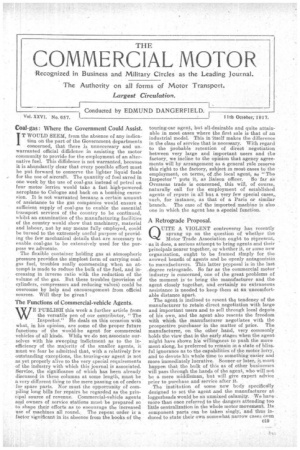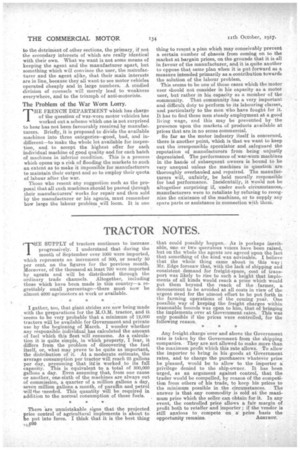Coal-gas: Where the Government Could Assist.
Page 1

Page 2

If you've noticed an error in this article please click here to report it so we can fix it.
IT WOULD SEEM, from the absence of any indication on the part of the Government departments concerned, that there is unnecessary and unwarranted official diffidence in assisting the motor community to provide for the employment of an alternative fuel. This diffidence is not warranted, because it is abundantly clear that every possible effort must be put forward to conserve the lighter liquid fuels for the use of aircraft. The quantity of fuel saved in one week by the use of coal-gas instead of petrol on four motor lorries would take 4, fast high-powered. aeroplane to Cologne and back on a bombing excursion. It is not warranted because a certain amount of assistance to the gas companies would ensure a sufficient supply of coal-gas to enable the essential transport services of the country to be continued, whilst an examination of the manufacturing facilities of the country would show that machinery, material and labour, not by any means fully employed, could be turned to the extremely, useful purpose of providing the few mechanical details that are necessary to enable coal-gas to be extensively used for the purpose we advocate.
The flexible container Holding gas at atmospheric pressure provides the simplest form of carrying coalgas fuel, troubles really commencing when an attempt is made 'to reduce the bulk of the fuel, and increasing in inverse ratio with the reduction of the volume of the gas. But these troubles (provision of cylinders, compressors and reducing valves) could be overcome by help and encouragement from official sources. Will they be given'?
The Functions of Commercial-vehicle Agents.
WE PLIBLISII this week a further article from
the versatile pen of our contributor, "The Inspector." He deals on this occasion with what, in his opinion, are some of the proper future functions of the would-be agent for commercial vehicles of all kinds. While we do not associate ourselves with his sweeping indictment as to the in, efficiency of the majority of the smaller agents, it must we fear be admitted that, with a relatively few outstanding exceptions, the, touring-car agent is not as yet properly alive to the very special requirements of the industry with which this journal is associated. Service, the significance of which has been already discussed in these columns at some length, must be a very different thing to the mere passing on of orders for spare parts. Nor must the opportunity of compiling long bills for repairs be regarded as the principal source of revenue. Commercial-vehicle agents and owners of service stations must be prepared so to shape their efforts as to encourage the increased use of machines all round., The repeat order is a factor significant in its absence from the books of the touring-car agent, but all-desirable and quite attainable in most cases where the first sale is that of an industrial model. This in itself makes the difference in the class of service that is necessary. With regard to the probable retention of direct negotiation between very large and important users and the factory, we incline to the opinion that agency agreements will by arrangement as a general rule reserve this right to the factory, subject in most cases to the employment, on terms, of .the local agent, as "The Inspector" puts it, as liaison officer. So far as Overseas trade is concerned, this will, of course, naturally call for the employment of established agents of repute in all but a very few special cases,, 'such, for instance, as that of a Paris or similar branch. The case of the imported machine is also one in which the agent has a special function.
A Retrograde Proposal.
QUITE A VIOLENT controversy has recently sprung up on the question of whetker the Motor Trade Association ought to iftresent, as it does, a serious attempt to bring agents and their principals nearer together, or whether it, or some new organization, ought to be framed simply for the avowed benefit of agents and be openly antagonistic to manufacturers. This latter proposal is in the last . degree retrograde. So far as the commercial motor industry is concerned, one of the great problems of the moment is to bring the manufacturer and the agent closely together, and certainly no extraneous assistance is needed to keep them at an uncomfortable distance apart. The agent is inclined to resent the tendency of the manufacturer to retain direct, negotiation with large and important users and to sell through local depots. of his own, and the agent also resents the freedom with which the manufacturer negotiates with the prospective purchaser in the matter of price. The manufacturer, on the other hand, very commonly . holds the view that in the early stages when the agent might have shown his' Willingness to push the move merit along, he preferred to remain in a state of blissful ignorance as to the capabilities of the motor lorry, • and to devote his whole time to something easier and more immediately lucrative. Sooner or later, it must happen that the bulk of this as of other businesses will pass through the hands of the agent, who will not be a mere middleinan, but will give expert advice
prior to purchase and service after it. .
The institution of some new body specificatlly designed to set the agent and the manufacturer at loggerheads would be an unmixed calamity. We have , more than once referred to the dangers attending too little centralization in the whole motor movement. Its component parts can be taken singly, and thus induced to state their own somewhat narrow cases even to the detriment of other sections, the primary, if not the secondary interests of which are really identical with their own. What we want is not some means of keeping the agent and the manufacturer apart, but something which will convince the user, the manufacturer and the agent alike, that their main interests are in line, because they all want to see motor vehicles operated cheaply and in large numbers. . A studied division of counsels will merely lead to weakness everywhere, and to the triumph of anti-motorists.
The Problem of the War Worn Lorry.
THE FRENCH DEPARTMENT which has charge of the question of war-worn motor vehicles has worked out a scheme which one is not surprised to hear has not been favourably received by manufacturers. Briefly, it is proposed to divide the available machines into three categories—good, bad, and indifferent—to Make the whole lot available for inspection, andto accept the highest offer for each individual machine of good quality and for each batch of machines in inferior condition. This is a process which opens up a risk of flooding the markets to such an extent as to make it impossible for manufacturers to maintain their output and so to employ their quota of labour after the war.
Those who resent a.ny suggestion such as the proposal that all such machines shoukl be passed through their manufacturers' works for repair and then sold by the manufacturer or his agents, must remember bow large the labour problem will loom. It is one thing to resent a plan which may conceivably prevent a certain number of chassis from coming on to the market at bargain prices, on the grounds that it is all in favour of the manufacturer, and it is quite another to oppose that same plan when it is put forward as a, measure intended primarily as a contribution towards the solution of the labour problem. .
This seems to be one of those cases which the motor user should not consider in his capacity as a motor user, but rather in his capacity as a member of the community. That community hats a very important and difficult duty to perform to its labouring classes, and particularly to the men who have fought for it. It has to find these men steady employment at a good living wage, and this may be prevented by the presence upon the markets of products available at prices that are in no sense commercial.
So far as the motor industry itself is concerned, there is another point, which is that we want to keep out the irresponsible speculator and safeguard the reputation of manufacturers from being unjustly depreciated. The performance of war-worn machines in the hands of subsequent owners is bound to be very unequal unless the machines in question are thoroughly overhauled and repaired. The manufacturers will, unfairly, be held morally responsible for bad performance. Incidentally, it would not be altogether surprising if, under such circumstances, manufacturers were to retaliate by refusing to reeognize the eiistence of the machines, or to supply any spare parts or assistance in connection with theni.






















